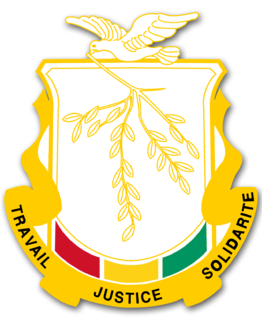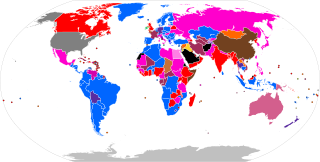
Elections in Benin take place within the framework of a multi-party democracy and a presidential system. Both the President and the National Assembly are directly elected by voters, with elections organised by the Autonomous National Electoral Commission (CENA).

Elections in Guinea-Bissau take place within the framework of a multi-party democracy and a semi-presidential system. Both the President and the National People's Assembly are directly elected by voters.

Elections in Jersey take place for the Assembly of the States of Jersey and at parish-level. Various parties have been formed over the years in Jersey, but few candidates stand for election affiliated to any political party. All elections in Jersey use the First-past-the-post voting system. In 2008, the voting age was reduced to 16 years.

Elections in Gabon take place within the framework of a presidential multi-party democracy with the Gabonese Democratic Party, in power since independence, as the dominant party. The President and National Assembly are directly elected, whilst the Senate is indirectly elected.

Elections in Malaysia exist at two levels: federal level and state level. Federal level elections are those for membership in the Dewan Rakyat, the lower house of Parliament, while state level elections are for membership in the various State Legislative Assemblies. The heads of executive branch at both the federal and state levels, the Prime Minister and Menteri Besar/Chief Ministers respectively, are indirectly elected, usually filled by a member of the majority party/coalition in the respective legislatures.

Philippine elections are of several types. The president, vice-president, and the senators are elected for a six-year term, while the members of the House of Representatives, governors, vice-governors, members of the Sangguniang Panlalawigan, mayors, vice-mayors, members of the Sangguniang Panlungsod/members of the Sangguniang Bayan, barangay officials, and the members of the Sangguniang Kabataan are elected to serve for a three-year term.

Guinea elects on the national level a head of state—the president—and a legislature. The president is elected for a five-year term by the people through a two-round system. The National Assembly has 114 members, elected for five-year terms, 38 members in single-seat constituencies and 76 members by proportional representation.
Elections in Hungary are held at two levels: general elections to elect the members of the National Assembly and local elections to elect local authorities. European Parliament elections are also held every 5 years.

Elections in Rwanda take place within the framework of a multi-party democracy and a presidential system. The President and majority of members of the Chamber of Deputies are directly elected, whilst the Senate is indirectly elected and partly appointed.

Elections in Togo take place within the framework of a presidential system. Both the President and the National Assembly are directly elected by voters. The country is a one party dominant state with the Union for the Republic in power.

Parliamentary elections were held in Kyrgyzstan on 27 February and 13 March 2005. The belief that the elections had been rigged by the government led to widespread protests, culminating in the Tulip Revolution on 24 March in which President Askar Akayev was overthrown.

The British Virgin Islands general election, 2007 was held in the British Virgin Islands on 20 August 2007. The result was a landslide victory for the opposition Virgin Islands Party (VIP) over the incumbent National Democratic Party (NDP).
Plurality-at-large voting, also known as block vote or multiple non-transferable vote (MNTV), is a non-proportional voting system for electing several representatives from a single multimember electoral district using a series of check boxes and tallying votes similar to a plurality election. Multiple winners are elected simultaneously to serve the district. Block voting is not a system for obtaining proportional representation; instead the usual result is that where the candidates divide into definitive parties the most popular party in the district sees its full slate of candidates elected, resulting in a landslide.

Elections were held in the state of Western Australia on 31 March 1962 to elect all 50 members to the Legislative Assembly. The Liberal-Country coalition government, led by Premier Sir David Brand, won a second term in office against the Labor Party, led by Opposition Leader Albert Hawke.

An electoral system is a set of rules that determine how elections and referendums are conducted and how their results are determined. Political electoral systems are organized by governments, while non-political elections may take place in business, non-profit organisations and informal organisations.

Parliamentary elections were held in Belarus on 23 September 2012. At stake were the 110 seats in the House of Representatives, the lower house of the National Assembly of Belarus.

General elections were held in Macedonia on 16 October 1994 to elect a President and Assembly, with a second round of Assembly elections on 30 October. The presidential election was won by Kiro Gligorov of the Alliance for Macedonia, whilst the parties forming Alliance for Macedonia also won the Assembly elections with 95 of the 120 seats. However, the second round of the Assembly elections were boycotted by VMRO-DPMNE and the Democratic Party, as they claimed there had been irregularities in the first round.

Parliamentary elections were held in the Socialist Republic of Macedonia on 11 November 1990, with a second round on 25 November. They were the first competitive elections in the country's history. VMRO-DPMNE emerged as the largest party, winning 38 of the 120 seats.

Parliamentary elections were held in Romania on 9 March 1975. The Front of Socialist Unity, dominated by the Romanian Communist Party and including other mass organisations, was the only organisation that contested the election. No prospective candidate could run for office without the Front's approval. The Front won all 349 seats in the Great National Assembly.

National Assembly elections were held in Bhutan in 2018; the first round was held on 15 September and the second round on 18 October.


















